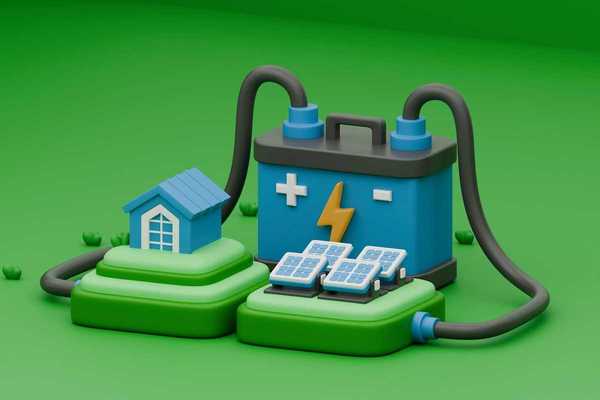solar
Battery demand 'straps on a rocket' in Australia as rooftop solar passes its peak
The Senate race in Nevada pits renewable energy against fossil fuels
Democratic Senator Jacky Rosen and Republican challenger Sam Brown differ sharply on climate policy and the development of Nevada’s solar industry.
In short:
- Rosen supports the Inflation Reduction Act and policies promoting clean energy and solar panel imports, while Brown opposes solar expansion, claiming it harms Nevada’s landscape.
- Brown advocates for increasing domestic oil and gas production and has criticized renewable energy projects for benefiting California over Nevadans.
- Nevada, with vast public lands and abundant sunshine, is key to the national energy transition, but faces tension between renewable energy development and conservation.
Key quote:
“Nevada is leading the nation in building a robust clean energy economy, which is creating new good-paying jobs and lowering costs across my state.”
— Jacky Rosen, U.S. Senator
Why this matters:
Nevada’s Senate race could shape U.S. energy policy. If Brown wins, the state’s renewable energy sector may face setbacks, impacting climate efforts and job growth tied to solar energy expansion.
Related:
China’s role complicates US solar energy boom
The Biden administration’s push for renewable energy is complicated by a trade battle with China, which supplies cheap solar panels and threatens US manufacturers.
In short:
- China’s overproduction of solar panels, fueled by subsidies, has slashed prices but threatens the U.S. solar industry.
- U.S. manufacturers argue that Chinese dominance could stifle domestic production and lead to eventual price hikes.
- Lobbying efforts by industry groups argue that limiting Chinese imports could hurt solar industry growth and climate goals.
Key quote:
“Consumers need to understand that when they buy solar panels from China, these are being made using coal-fired power plants.”
— Tim Brightbill, U.S. solar panel trade lawyer
Why this matters:
China produces 80% of the world’s solar panels, raising concerns over U.S. energy independence and environmental impacts. The ongoing trade war may shape the future of both the US solar industry and global clean energy goals.
Learn more:
US-China trade tensions hit Southeast Asia’s solar industry, impact EU
US tariffs on Southeast Asian solar panel exports may disrupt Chinese-owned solar companies in the region, complicating the EU’s solar expansion efforts.
In short:
- Southeast Asian solar producers face rising US tariffs, which could reduce solar panel exports to the US.
- Chinese solar firms in the region have scaled back operations, affecting the EU’s solar manufacturing ambitions.
- Some manufacturers are shifting production to other Southeast Asian nations not currently facing tariffs, like Indonesia and Laos.
Key quote:
"Southeast Asian solar panels could flood the EU market as they are squeezed out of the US."
— Indra Overland, head of the Norwegian Institute of International Affairs' Center for Energy Research
Why this matters:
US tariffs could undermine the EU's solar industry by increasing competition from Southeast Asia. These shifts may also reshape global solar supply chains, influencing renewable energy access worldwide.
Related: American solar firms request federal action against Asian competitors
Mississippi limits discussion at solar summit as renewable energy advocates silenced
At a solar summit in Mississippi, renewable energy advocates were denied a chance to respond to regulators’ questions, sparking frustration among industry supporters.
In short:
- Mississippi Public Service Commission officials cut off comments from solar advocates during an open discussion at a recent summit.
- The event featured a speaker from a fossil fuel-backed think tank, while the clean energy industry had no official representation.
- Mississippi ranks low in solar energy production despite its high potential, generating less than 1% of its energy from solar.
Key quote:
“We want to hear from people who are not selling solar panels.”
— De’Keither Stamps, Mississippi Public Service Central District Commissioner
Why this matters:
Mississippi’s actions could further slow the adoption of renewable energy in one of the sunniest states. As climate concerns mount, stalling clean energy progress undermines national and global efforts to reduce carbon emissions.
Related:
Fossil fuel ties exposed in Ohio solar opposition group
Testimony has revealed that an anti-solar group in Ohio, claiming to be grassroots, is heavily funded by a prominent figure in the natural gas industry.
In short:
- Jared Yost, leader of Knox Smart Development, admitted a major donor is linked to the natural gas industry.
- The group's funding contradicts its claims of being a local grassroots organization opposing solar energy projects.
- The case highlights how misinformation can be spread under the guise of community activism to oppose renewable energy.
Key quote:
“No one has ever tried to direct me in any way with my opposition to this project. I am nobody’s ‘puppet’.”
— Jared Yost, leader of Knox Smart Development
Why this matters:
The fossil fuel industry's covert funding of local opposition groups can mislead communities and hinder the adoption of renewable energy, posing challenges for the clean energy transition critical to addressing climate change.
Related:
Solar energy debate in Louisiana reveals misleading claims by lawmakers
A Louisiana legislative hearing on solar energy featured several misleading claims, including exaggerations about the impact of federal subsidies and the costs of renewable energy.
In short:
- Louisiana's Agriculture Commissioner inaccurately claimed that federal subsidies heavily favor renewables over fossil fuels in the state.
- Claims that solar and wind industries would collapse without subsidies were refuted by economists, who noted solar power is already the cheapest form of energy.
- Assertions that solar farms threaten Louisiana's agriculture lacked evidence, with experts emphasizing solar's minimal land use.
Why this matters:
Misinformation about renewable energy can hinder Louisiana's progress toward a sustainable energy future, impacting policy decisions and public opinion.
Related EHN coverage:










